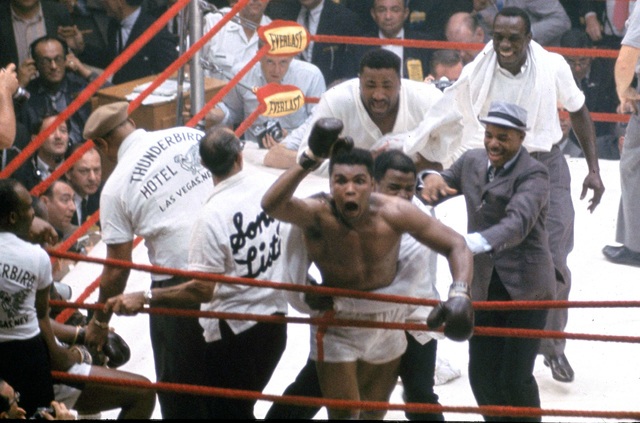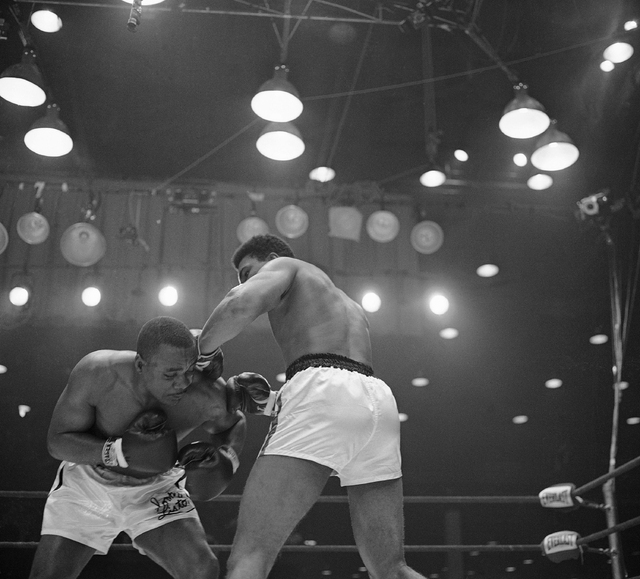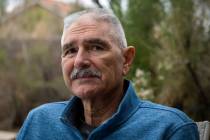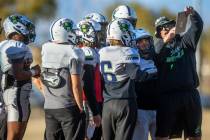Fixed? Ali-Liston story mostly shadow, little substance
On the 50th anniversary of Muhammad Ali’s stunning upset over Sonny Liston in their first fight, which was Tuesday, The Washington Times ran a story suggesting the bout might have been fixed.
The newspaper obtained documents that “show the FBI suspected the fight may have been fixed by a Las Vegas figure tied to organized crime and to Liston.”
Suspected.
May have.
“The fix is in …”. That is how the headline on CBSsports.com began.
These FBI documents are 40 years old, and this was when J. Edgar Hoover had a file on everything that moved. Even things that moved as slowly as Sonny Liston.
Plus, this story had more holes than the left side of the Cubs’ infield. And misleading statements. Such as: “Ali did not respond to repeated requests for comment from The Times.”
Has The Times been holed up in a cave somewhere with Randall “Tex” Cobb?
You could ask Ali a million times to comment on his fights with Liston, and he will not respond, because Ali has Parkinson’s disease and he cannot respond.
Naturally, the men in the middle of this tawdry tale — Las Vegas gambler and former Liston confidant Ash Resnick, a Houston gambler named Barnett Magids and Liston himself — are dead. They did not respond to interview requests, either.
When they were alive, the FBI never bothered to interview any of them, not at least according to this story.
Sonny Liston fought in shadows, and he palled around with shadowy figures. Sometimes, as in his second fight with Ali, he got hit with phantom punches. The needle they found in his arm here in 1970 was not so phantom. It killed him. Or it might have killed him.
Some of Sonny’s associates had drug connections, his friends admit. They also say he hated needles. The official cause of his death: lung congestion and heart failure.
More shadows.
When I read this newspaper story with the holes I called Lem Banker, another professional gambler, who was Sonny Liston’s best friend. So Lem says, and he has stories to back it up.
The FBI never asked Banker about Sonny Liston, either. Perhaps they knew about Lem and Eartha Kitt in ’57, and they “suspected” he “might have” told that story — and a lot of other stories — and it would have taken all day, and the FBI had better things to do.
On the 50th anniversary of the day Cassius Clay, as Ali was known then, “shook up the world,” Lem Banker said he moved a substantial bet for Liston that he’d win and the fight would not go four rounds, and then he hedged it: not because he suspected funny business, but because Sonny had not trained worth a damn, and, in Lem Banker’s words, “$5,000 at that time was quite a bit of money.”
Liston was 32 then. Banker said he probably was closer to 40, because Sonny was one of 25 children and his folks didn’t exactly keep birth certificates in a file cabinet.
“The first fight, Sonny never paced himself,” Banker said. “He was 10 years older (than they said); he ran out of gas, trying to win that four-round bet.”
Banker said he watched Ali-Liston I on closed circuit TV at the Las Vegas Convention Center. Sheriff Ralph Lamb sat next to him. Retired Hall of Fame sportswriter Jerry Izenberg, who now makes his home in Henderson, watched from ringside at the Miami Beach Convention Center.
Izenberg also remembers Liston being way out of shape — Sonny, according to a new story in Esquire that did not mention the possibility of the fight being fixed, “trained as normal, running around five miles a day, eating hot dogs and drinking beer.”
Izenberg, too, said Liston came at Ali hard in the early rounds.
Nobody at ringside expected Ali to win, Izenberg said, because Liston was a mean bear (but smarter than people thought) who fought in shadows, and Ali was a loud mouth who didn’t look that great against Charlie Powell, the former football player, and Henry Cooper and Doug Jones in his previous three fights.
Sonny quit on his stool after the sixth round. Nobody, Izenberg said, thought that was by design.
“There was just no evidence, to Sonny, that this guy could fight.”
Here, then, is the most titillating part of the Washington Times story: “At about noon on the day of the fight, (Barnett Magids) reached Resnick again by phone, and at this time, Resnick said for him to not make any bets, but just go watch the fight on pay TV, and he would know why …”
This was after the weigh-in, when Ali went berserk and Sonny just burped up a couple of those hot dogs.
Is it possible this is why Ash Resnick might have told Barnett Magids — according to Magids — not to make any bets on Liston?
According to a Sports Illustrated story, Resnick lost a lot of money betting on Liston, though he did talk Sonny into wearing a robe that said “Thunderbird Hotel” on back; Resnick’s title then was Thunderbird Hotel “athletic director.”
The Washington Times’ story suggested (there’s that word again) the magazine story may have been a cover-up, quoting “people in the know.”
Sometimes in boxing, a guy trains on hot dogs and beer, and then maybe he injures his shoulder. A guy everybody expects to win, doesn’t win. And then there are FBI files and conspiracy theories, and then “people in the know” want to put a guy like Sonny Liston on the grassy knoll with a smoking gun in his hand.
That’s just how it is when you fight in shadows, even long after you’re gone.
Las Vegas Review-Journal sports columnist Ron Kantowski can be reached at rkantowski@reviewjournal.com or 702-383-0352. Follow him on Twitter: @ronkantowski























